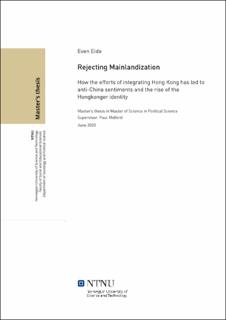| dc.contributor.advisor | Midford, Paul | |
| dc.contributor.author | Eide, Even | |
| dc.date.accessioned | 2021-09-28T17:32:41Z | |
| dc.date.available | 2021-09-28T17:32:41Z | |
| dc.date.issued | 2020 | |
| dc.identifier | no.ntnu:inspera:53627983:16568976 | |
| dc.identifier.uri | https://hdl.handle.net/11250/2784516 | |
| dc.description.abstract | I denne masteroppgåva konkludera eg at ein veksande identitet i Hong Kong er basert på ei
avvising av fastlandisering – forsøket på å integrere Hong Kong – og dette held protestane
gåande i sin limboperiode. Forsøket på å fastlandisere Hong Kong har slått hardt tilbake og
ført til framveksten av det motsatte av den originale intensjonen til regjeringa i Hong Kong
og Beijing. Formålet var å fostre ein populasjon som ville samarbeide, føle stoltheit til sin
kinesiske identitet og spele si rolle som ein del av Kina. Dei fekk i staden ein fiendtleg Hong
Kong identitet med ungdomen i avantgarden, og denne identiteten er basert på å ikkje
identifisere på å ikkje identifisere seg som kinesisk. Dette er eitt opprop frå eitt stort
segment av populasjonen i Hong Kong etter å være distinkt frå fastlandet.
Denne masteroppgåva viser at denne avvisinga har sine røter tilbake til perioden
etter den britiske overleveringa av Hong Kong til fastlandet i 1997. Gjennom ein kvalitativ
studie som tek i bruk prosessporing, testar denne masteroppgåva tre hypotesar. Desse
innebera at den veksande identiteten i Hong Kong anten er basert på: ei avvising av
fastlandisering, eitt ynskje for demokrati eller opposisjon til Kina sin økonomiske vekst. | |
| dc.description.abstract | My conclusion in this thesis is that an emerging Hong Kong identity based on a rejection of
Mainlandization – the efforts of integrating Hong Kong – is fueling the protests in its period
of limbo. These efforts have massively backfired, giving birth to the opposite of what was
intended by the Hong Kong and Beijing government: a population that would cooperate, feel
prideful in their Chinese identity and play their role as a part of China. What they got
instead was an increasingly hostile Hongkonger identity, spearheaded by the youth,
predicated on not being identifying as Chinese. This is a call by large segments of Hong
Kong’s population to be distinct from the Mainland.
This thesis argues that this rejection has its roots back to the period after the British
handover of Hong Kong to China in 1997. Through a qualitative study utilizing process
tracing, this thesis traces three hypothesizes from 1997 and onwards, hypothesizing that
the emergence of a Hongkonger identity might be either: a rejection of Mainlandization, a
desire for democracy, or opposition to the economic rise of China. | |
| dc.language | eng | |
| dc.publisher | NTNU | |
| dc.title | Avvisning av fastlandisering | |
| dc.type | Master thesis | |
